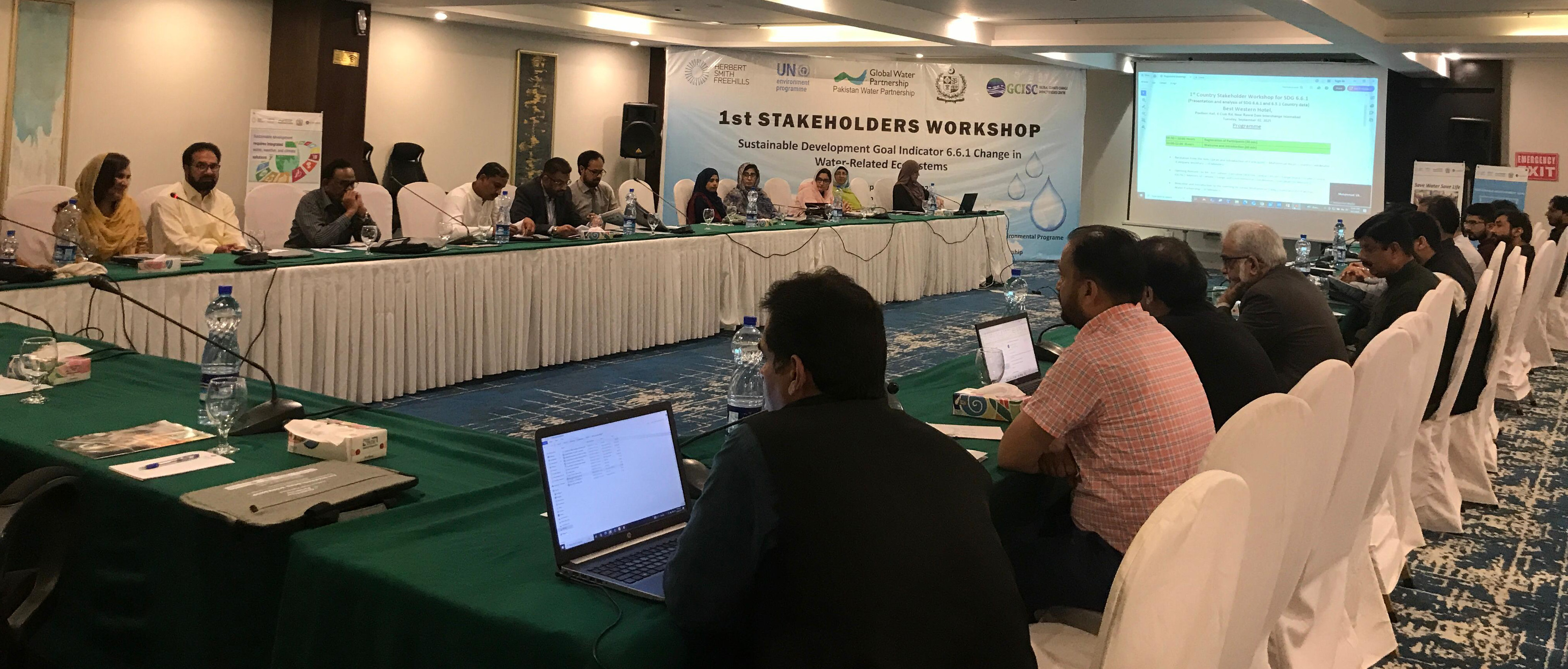The gathering brought together an influential mix of government representatives, non-governmental networks, and leading academics to align on one of the sustainability benchmarks: SDG indicator 6.6.1, which tracks changes in water-related ecosystems over time.
 The workshop was inaugurated by Mr Sardar Muhammad Tariq, Chairman of the Pakistan Water Partnership (PWP), and Mr M. Arif Goheer, Executive Director of the Global Change Impact Studies Centre (GCISC). Expert voices, including Dr Muhammad Ukasha and Ms Qurat-ul-Ain Ahmad, Focal Point for SDG 6.6.1 at the Ministry of Climate Change and Environmental Coordination, provided a sobering yet insightful picture of Pakistan’s freshwater landscape—highlighting not only the fragile state of rivers, canals, and wetlands but also the looming threats posed by glacial melt and desertification.
The workshop was inaugurated by Mr Sardar Muhammad Tariq, Chairman of the Pakistan Water Partnership (PWP), and Mr M. Arif Goheer, Executive Director of the Global Change Impact Studies Centre (GCISC). Expert voices, including Dr Muhammad Ukasha and Ms Qurat-ul-Ain Ahmad, Focal Point for SDG 6.6.1 at the Ministry of Climate Change and Environmental Coordination, provided a sobering yet insightful picture of Pakistan’s freshwater landscape—highlighting not only the fragile state of rivers, canals, and wetlands but also the looming threats posed by glacial melt and desertification.
What emerged from the discussions was a clear picture of urgency. Participants raised alarms about arsenic contamination in Punjab, water scarcity in Tharparkar and Cholistan, unregulated waste polluting rivers, and delays in crucial infrastructure projects. At the same time, they put forward practical pathways for hope: rainwater harvesting, construction of small dams, restoration of degraded ecosystems, expansion of canal networks, and stronger integration of environmental accountability into governance and corporate responsibility.
By the end of the workshop, two urgent priorities stood out as essential for safeguarding Pakistan’s freshwater future:
- Strengthening data collection to better monitor and understand ecosystem changes.
- Advancing integrated water resource management (IWRM) anchored in equity, efficiency, and sustainability.
 The Bigger Picture: A Global Effort for Freshwater Ecosystems
The Bigger Picture: A Global Effort for Freshwater Ecosystems
This initiative is part of the second phase of the SDG 6.6.1 project, running from mid-2025 to 2026, funded by the United Nations Environment Programme (UNEP) and executed by the Global Water Partnership Organisation (GWPO), with legal support from Herbert Smith Freehills LLP (HSF). Pakistan is one of only three countries - alongside Zambia and Peru - selected to pioneer this model as part of their commitments to the Freshwater Challenge.
The project’s overarching goal is to accelerate progress toward SDG Target 6.6: protecting and restoring water-related ecosystems by 2030. The progress will align with existing national commitments, from the CEO Water Mandate’s Water Resilience Coalition to National Biodiversity Strategies and Action Plans (NBSAPs) and National Adaptation Plans (NAPs) under the UN climate framework. Although most of the countries have already defined their national targets derived from such frameworks, many of which are not currently on track. Therefore, the pilot project will aim to assist each country to define a unified document referred to as a Country Commitment - a single guided document setting clear subsidiary targets and governance reforms that will unlock faster, more coordinated action. The said conditions are being understood by taking into account countries’ SDG 6.6.1 data, as well as the evaluation of performance under SDG indicator 6.5.1 on the degree of implementation of IWRM.
The project unfolds in three phases:
- Phase 1 (Assessment): Identifying key institutions, presenting SDG 6.6.1 data, and contextualizing root causes of ecosystem decline.
- Phase 2 (Proposal): Defining priority challenges, drafting response strategies, and producing a policy brief to guide the Country Commitment.
- Phase 3 (Formalisation): Validating and finalising the Country Commitment for national adoption and implementation.
The project inspired by the lessons learned from the first pilot (2020–2022) in Argentina, Kazakhstan, and Kenya, where governments, NGOs, and communities came together to develop cross-sectoral action plans for freshwater protection. The results of that first project, implemented in reveal several learnings that are supporting ongoing efforts aiming to provide better support to countries on SDG 6.6.
Ultimately, the workshop in Islamabad marked just the beginning of the 2nd Phase of accelerating the protection and restoration of freshwater ecosystems project in Pakistan. The implementation of Pakistan’s Country Commitment will not only determine the health of its rivers, wetlands, and groundwater systems but will also shape its resilience to climate shocks, food security challenges, and urban water stress. It is expected the Pakistan pilot will adapt and scale those insights - creating a model that can later be expanded to more countries worldwide.
Next Steps: Turning Commitments into Action
The Islamabad workshop was the start of a roadmap for change. In the coming months the country expert will focus on drafting and validating Pakistan’s Country Commitment, a guiding document that aligns national priorities with international targets under SDG 6.6. This process will bring together policymakers, scientists, and community leaders to identify realistic, equity-driven strategies for restoring freshwater ecosystems.
The ultimate goal of the project is implementation of this Country Commitment where its success will depend on building momentum for IWRM and investing in ecosystem restoration and ensuring that local communities are both beneficiaries and partners in conservation. Importantly, the model will be scalable with the potential to attract greater financial and political support so that more countries can replicate the approach in the future.
What lies ahead is ambitious: curbing pollution, addressing data gaps, restoring degraded rivers and wetlands, and protecting vulnerable communities from worsening droughts and water shortages. But the stakes could not be higher. Freshwater is not just a resource—it is Pakistan’s lifeline. If this pilot succeeds, Pakistan has the opportunity to become a regional leader in freshwater resilience, showing how collaborative governance, science-driven policy, and community engagement can reverse ecosystem decline.
